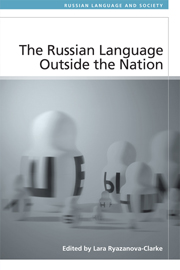Book contents
- Frontmatter
- Contents
- Notes on Contributors
- Cyrillic Transliteration System Adopted in the Book
- Introduction: The Russian Language, Challenged by Globalisation
- PART I Russian and Its Legal Status
- PART II Linguistic Perceptions and Symbolic Values
- PART III Russian-Speaking Communities and Identity Negotiations
- PART IV Language Contact and the Globalisation of Russian
- PART V Globalisation of Russian as Soft Power
- Index
Introduction: The Russian Language, Challenged by Globalisation
Published online by Cambridge University Press: 05 September 2014
- Frontmatter
- Contents
- Notes on Contributors
- Cyrillic Transliteration System Adopted in the Book
- Introduction: The Russian Language, Challenged by Globalisation
- PART I Russian and Its Legal Status
- PART II Linguistic Perceptions and Symbolic Values
- PART III Russian-Speaking Communities and Identity Negotiations
- PART IV Language Contact and the Globalisation of Russian
- PART V Globalisation of Russian as Soft Power
- Index
Summary
RUSSIAN LANGUAGE AND THE SOCIOLINGUISTICS OF GLOBALISATION
Globalisation has been noted to be one of the principle challenges for the contemporary study of language in society (de Swaan 2001; Calvet 2006; Fairclough 2006; Pennycook 2007; Blommaert 2010; Coupland 2010). As it sets out to develop new arguments, vocabularies and parameters (Blommaert 2010), the emerging field of sociolinguistics of globalisation redefines the relationship between language and space in the modern world (Mikhalchenko and Trushkova 2003; Gal 2010; Blommaert and Dong 2010). In recent decades, space has been a dramatic factor in defining the state of the Russian language which has experienced on the one hand, multiple physical and symbolic departures and, at the same time, has unprecedentedly stretched its segment in the linguasphere, that is the linguistic mantle ‘extended around the planet by humankind’ (Dalby 2001: 23). In addition to the fact that the end of Communism in itself engendered a deep change in the world order by triggering an intensification of the process of globalisation (Robertson 1992), the implosion of the Soviet Union had most important consequences for the sociology of Russian. Since 1991, the global distribution of the Russian language has changed beyond any expectations: it shifted from being the principal language of one state to the language spoken, apart from in the metropolis of Russia, by sizeable groups of speakers in fourteen other countries – successors of the USSR. Additionally, the introduction of relative ease of movement caused a new wave of outward migration of Russian speakers from virtually all countries of the former Soviet space to the outside world.
- Type
- Chapter
- Information
- The Russian Language Outside the Nation , pp. 1 - 30Publisher: Edinburgh University PressPrint publication year: 2014

